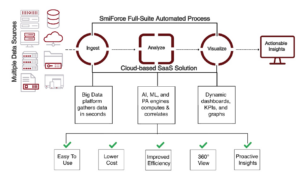One of the most common challenges in IT infrastructure management is maintaining sufficient space and power. As a business grows and ages, it will naturally acquire more data, which will, in turn, require more storage space. Purchasing new IT equipment is usually only a stopgap, as it can quickly outgrow the available office space, power and cooling capabilities. So what’s the solution – colocation or data center? And what, exactly, is the difference between the two?
To learn how to choose a colocation partner that fits your business’ unique needs, download our free colocation guide today.
Let’s begin with a brief definition of each:
Data Center:
Networked computer servers used for the storage or processing of data for daily use as well as backup and disaster recovery. These servers can be hosted in-house or in a remote data center facility.
Colocation:
Colocation facilities provide the space, power and bandwidth to store servers and IT equipment. Many businesses utilize the same facility for storage.
At first glance, the two appear very similar. But there is one key difference: with colocation, businesses provide their own servers and equipment.
Without knowing more, it would seem that data centers are the easier and better choice. But that’s not necessarily the case. There are several benefits to colocation:
- Lower cost: Sharing overhead with other businesses lower the total expense, and storing in facilities specifically designated for colocation increases energy efficiency.
- Access and ease of use: When IT professionals work on-site at colocation facilities, efficiency increases. Dedicated facility staff is available to help with any issues that arise.
- Network accessibility: Colocation facilities allow companies to connect with multiple carriers, regional networks and internet service providers.
- Network neutrality: When colocation providers are network neutral, companies can be in control of their own network strategy.
- Security: Colocation facilities are secure against any kind of threat – physical or virtual.
- Disaster readiness: Colocating allows companies to choose a facility that may be safer from weather threats than business headquarters.
- Easier compliance: Colocation facilities will maintain detailed records, making it easy for companies to produce compliance documentation.
Still not sure whether colocation or data center is right for your business? Download our free colocation guide, then get in touch. Vaultas offers both data center storage and colocation throughout Minnesota and Wisconsin. We will help customize a solution to meet your company’s unique needs.






